
"I won't go anywhere without you"
Circle was a 2017 Sci-Fi drama focused on the lives of a set of twin boys/men with each episode split into two parts. The first half was set in the then present of 2017 and the second half in 2037. This structure doesn’t always work with different actors playing the same characters in different times as too often I become invested in one story and not the other. However, I found this format quite effective for this suspenseful drama. In fact, they even go back 10 years to when the twins were young boys in several episodes and that worked as well.Twins Woo Jin and Beom Gyun have a close encounter of the third kind one night along with their father. When their father seemingly abandons them, the boys handle the loss differently. Beom Gyun acts out and ends up serving time in a psychiatric hospital and later, jail. Woo Jin studies hard at university and labors to take care of his grandmother who lives in a nursing home. When students on campus begin committing suicide, both boys will become embroiled in a sinister plot neither was prepared for. In 2037 Kim Joon Hyuk is a detective at the Gangnam police department. The air quality has deteriorated significantly and personal oxygen devices are necessary at times. Seoul has lost 50% of its population. In a separate area lies a secured population living in what is called Smart Earth where there is no crime and the wealthy live easier lives. The only price is that everyone must have a chip installed behind their ear that regulates their emotions, and possibly more. When the first murder occurs after 5000 days without a crime, Joon Hyuk goes to investigate and discovers the case may link him to his past.
While there were times the production values appeared low, I didn’t mind. A compelling story that drew me in with interesting characters covered over several plot holes and some poor direction choices. I wasn’t tempted to fast forward or skip about. The brothers’ ordeals and devotion to each other touched me. Both timelines had value and neither ran out of steam until the worlds finally collided. While there were some romantic feelings between the twins and the young women in their lives, there weren’t any real romances, a bit of relief for this drama.
Circle only reinforced my belief that South Korea has the best child actors. The two boys who played Woo Jin and Beom Gyun as children were charming and emotionally engaging to watch. I have a soft spot for Yeo Jin Goo and he was lovely as the devoted brother Woo Jin. I was not familiar with Kim Kang Woo and enjoyed his emotional turn at Joon Hyuk. Gong Seung Yeon as the enigmatic hacker Han Jung Yeon did a good job as well. Some of the supporting cast was not as strong.
It’s been a long time since I’ve enjoyed a Kdrama this much. Most have been forgettable in recent years. Instead of throwing pretty people and an encyclopedia of tropes at the screen hoping something would stick, Circle’s writers crafted an entertaining drama that came, well, full circle. I will remember this drama and may go back and visit it again.
27 April 2024
Was this review helpful to you?
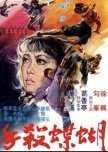
"You look familiar"
White Butterfly Killer falls deeply into the woman wronged revenge kung fu flick genre. Hsu Feng played the woman who had survived the death of her grandfather and sexual assault by a gang of bandits. After six long years she finally comes face to face with them and prepares to take them out one by one.The White Butterfly owns an inn on the Leopard Mountain where all sorts of ruffians hang out. She and her girls who are trained in kung fu serve the customers and take down any men who cause trouble in her place. One evening a familiar face walks in. She recognizes him as one of the gang members who assaulted her and killed her grandfather. The White Butterfly enlists her trusted sidekicks to help her destroy the gang that set her life on a new course. In that gang, is one man who had helped her escape. Would he help her again or bring about her death?
White Butterfly Killer was a low budget Taiwanese movie. Much of the filming took place on a rundown location and a dusty road which lent an old west feel to it. The setting would alternate between day and night depending on who was on screen. The film opened with a fight between two factions that ended up at her inn as she took in a wounded inspector. This was never really brought up again. An inspector might have been pertinent with a band of vile outlaws staying under the same roof, but there you go. Somewhere through the years the sides have been cropped off the film which always makes the action concentrated in the center.
Hsu Feng may not have been a martial artist but kept up with the men she fought quite well. Her fighting was no worse than many of the extras with the choreography provided and her acting was stronger than some of the women in kung fu movies at the time. The “good” guy in the gang played by Kou Feng was a strange character. He hated some of the things the gang did but owed his life to the leader, his adoptive father. He encouraged Hsu’s character to just leave everything in the past. “Those who kill, will be killed.” Somehow that line is almost never used on men seeking justice/revenge for wrongs. And the ending drove that point home in case women didn’t catch it. Had it not been for the downer of an ending I might have rated this slightly higher.
The White Butterfly’s philosophy reminded me of the lyrics to The (Dixie) Chick’s song---
“I’m not ready to make nice. I’m not ready to back down.
I'm still mad as hell, and I don't have time to go 'round and 'round and 'round
It's too late to make it right, I probably wouldn't if I could
'Cause I'm mad as hell, can't bring myself to do what it is you think I should”
24 April 2024
Was this review helpful to you?

"We live and we die"
Shogun is based on the popular novel by James Clavell which in turn was very loosely based on historical events from Japan around 1600 C.E. I devoured the book years ago and watched the original mini-series starring Richard Chamberlain and Mifune Toshiro. I have been both excitedly and trepidatiously waiting for this updated version to come out. There were some improvements and also disappointments with the latest rendition.“Why is it those who have never been in battle are so eager to be in one?”
English pilot John Blackthorne is one of a handful of survivors aboard the Dutch ship Erasmus that lands in a Japanese fishing harbor. He and his men are taken prisoner by the village’s manager, Omi. Elsewhere, Lord Toranaga is called to the Osaka castle to meet with the other four regents of the Taiko’s heir who are bent on taking him down. He tells them he has no intentions of starting hostilities with them, but they intend to force him to commit seppuku. Back at Ajiro, Omi and his uncle and lord, Yabushige, decide the ship and its weapons might help them to make allies when the war starts. Though they are vassals of Toranaga they believe him to be a dead man. Before they can put any plan into action Toranaga’s right hand man, Hiromatsu, shows up laying claiming to the ship and its contents for Lord Toranaga, including Blackthorne. Toranaga has Mariko serve as Blackthorne’s interpreter as they can both speak Portuguese. All three, Toranaga, Blackthorne, and Mariko will face death and deception on numerous occasions and will have to use all of their abilities to change the fates laid out before them. The Portuguese and changing alliances of the regents and the heir’s mother’s influence are a powder keg of explosive political desires.
“A woman must stare without fear into the cruel eyes of fate and make herself seen”
Blackthorne was disappointing in this version of Shogun. Gone was the inquisitive and crafty personality along with the better relationship with Toranaga. As played by Cosmo Jarvis, he came across as a punch-drunk prize fighter. The slow build up in the book to understanding the language and world around him seemed fast tracked. Also, the key moment when his mental shift went from English to Japanese in the book was disappointingly left out. The scene would also have bookended Mariko’s emotional scene in the 9th episode. That key scene was also what caused the bonding between him and his interpreter. Shoving it in near the end of the drama felt awkward. Another awkward development was that it took a moment to figure out that when people were speaking English, it was supposed to be understood as Portuguese. In the book Latin, English, and Spanish were also spoken, so I suppose it simplified things for the actors and writers, and especially for English speaking audiences and making it more accessible to them to use just the one language. Okay, rant over. Mariko was more severe in this interpretation of her character, but she was as always highly capable and intelligent, understanding the political undercurrents of people’s actions. In fact, Mariko’s actions were as important and vital to Toranaga’s mission as any man’s, maybe more so. Like Toranaga, she was thankfully introduced earlier in this drama than in the book. There were other women who played important roles—Fuji (Fujiko) the reluctant but devoted consort, Kiku the courtesan, and Ochiba the heir’s plotting mother.
“She hides herself in the sun. Conserves her energy, waiting for her moment. You might never know she is there.”
What was well done was that they didn’t just show the story from the Englishman's perspective as an introduction to Japanese society and history. Much of the drama was in Japanese and though the political maneuverings were narrowed down for the small screen, many of the primary characters were fleshed out. Sanada Hiroyuki as Lord Toranaga gave a quietly powerful performance as the most cunning man in Japan. Toranaga was introduced early and used often to exploit his screen presence. Outwardly, Toranaga proclaimed he had no desire to be Shogun, but he used his extensive network of spies to lay in place a long-term plan to do just that. As a falconer, he broke many men to his fist. Everyone was a possible enemy and he kept his plans in his secretive heart. He even manipulated disasters to his benefit, always knowing when to use his human chess pieces and when to sacrifice them. The English pilot, Anjin, came at the right time, a chess piece that might prove valuable. Sanada’s scene with Nishioka Tokuma as Hiromatsu when all seemed lost was one of the best and most touching of the drama. The two actors traded deep feelings with flickers of their eyes and micro expressions that conveyed the depth of their friendship, loss, and commitment.
“Some are born under a banner of greatness, others must claim it”
The sets and costumes were luxurious. I wish they hadn’t been so committed to using blue filters because it looked as if the land of the rising sun was perpetually in twilight and fog. There was gore, but more for the shock value of the realistic violence without being overly gratuitous. There were scenes of sexual intimacy that also didn’t delve into gratuity. But fair warning, the writers weren’t afraid to use Clavell’s salty language.
“Loyalty does not have an end”
Despite some of my reservations about Blackthorne’s character and actor, and a few of the changes made to the story, I enjoyed this drama. The production values were of a high quality for television. Clavell had a great regard for Japan despite having been a POW during WWII. It was clear he felt Blackthorne was indeed the barbarian in need of civilizing as evidenced when the pilot met his crew later in the drama. The original mini-series didn’t subtitle the Japanese dialogue so that the audience would be as lost as Blackthorne. This time, we were treated to what was going on with the different characters as they made allies, betrayed each other, and played a dangerous game to have their man become the next Shogun or as in the case of the Portuguese, do whatever was necessary to maintain their monopoly in the region. And there were those like Yabushiga constantly trying to play both sides against the middle to survive the coming storm. Having read the book and watched the original mini-series when I was much younger, I am favorably biased toward this story. This was not a white savior tale, the book and the drama tell you who was pulling all the strings. As did the historical figure he was based upon, Blackthorne had his uses, but ultimately this was Toranaga’s journey to becoming Shogun.
“If I could use words
Like scattering flowers and
Falling leaves
What a bonfire my poems
Would make”
-Mariko
23 April 2024
Was this review helpful to you?

"Big stories, like life, get out of control"
Gone with the Bullets was loosely inspired by the real-life events that led to China’s first film. I say loosely because very little in this film was realistic from the opium induced car ride in the sky to the cartoon reenactments of a supposed crime scene. A kaleidoscope of primary colors doused the screen in a variety of manners. The realistic elements were the dangers of the court of public opinion and how films could be utilized for propaganda.Ma Zouri is a fixer and a con artist extraordinaire. When the 7th son of the local warlord comes to him for help, Ma smells an easy mark. He and his partner, Xiang Feitian, decide to use Wu Qi’s money to hold the largest courtesan contest in the world, open to all ladies of the evening. The pageant is shared over the radio and filmed by the warlord’s 6th child, Wu Liu. The beautiful Yin Wanyan, and Ma’s lover, wins after promising 30 men she will entertain them and let them discover her “virginity.” The newly crowned President asks Ma to marry her which he refuses. They go on an opium induced car ride after making up. The next morning Ma wakes to find the car turned over and Wanyan dead. He runs to Wu Liu for help as he’s wanted for murder. During his two years on the run, he discovers there is a lurid play based on Wanyan’s death with audience participation.
"When the fake becomes real the real often becomes fake"
The film opened to music from 2001: A Space Odyssey, quotes from Shakespeare’s Hamlet, and an homage to the Godfather. It didn’t stop there. Numerous movies, events and songs were used regardless of time and circumstance. One contestant sang Summertime by Gershwin which wouldn’t be written for another decade when it was used in Porgy and Bess. The ode to motherhood also looked suspiciously like something out of 42nd Street. Reality and memory blended at times making it hard to tell what was real.
"We have to go fast to be nowhere"
Director Jiang Wen also starred as Ma Zouri with the capable Ge You as the duplicitous Xiang. An ethereal Shu Qi brought Wanyan to life and Jiang’s wife, Zhou Yun, was marvelous as Wu-6th aka Wu Liu. No expense was spared on the opulent sets and luxurious costumes. The talent portion of the contest was filmed on a huge stage with numerous scantily clad dancers in well choreographed dance numbers. I was surprised to see so much skin and gratuitous crotch shots in a Chinese film. Even more surprised in a fan dance number filmed from above where the dancers’ fans provocatively looked like vaginas. There were also poop jokes, self pleasuring, and a prisoner threatened with being “hammered” by a horse.
“The audience is always right.”
The story wasn’t always cohesive in this allegory or spoof of the movie industry and lawless land governed by corrupt foreign entities and warlords. “Love is nice but violence makes money!” Theater reenactments of the crime honed in on the violence the audience wanted to watch. After seeing the performances their minds were made up to Ma’s guilt. No trial, no witnesses, no evidence, only the court of public opinion for what would be the final show to be filmed by Wu Liu. And those in power saw no reason to not give the people what they wanted if it benefited them. Reality is easily manipulated on film in Jiang’s wink to propaganda. Gone with the Wind, I mean Bullets, was a strange but entertaining film that focused on one man’s downfall precipitated by his own hubris and also, “no good deed goes unpunished.”
18 April 2024
Was this review helpful to you?
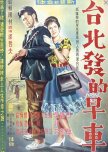
"There will be no end to the sorrow"
Early Train from Taipei is one of about 200 Taiwanese language films to have survived that were made between 1955-1970. This film was popular during its day and has been restored with only a few flickering skips still evident. There was no doubt what type of film this was going to be during the intro when an artist tells his friend there is a sad story behind two disparate paintings of the same woman. While I can appreciate its place in history, the endless melodrama and flat characters caused my interest to wear thin by the end.Siu Lan and Hue Thao are two beautiful people who live and work in the countryside and love each other. Siu Lan’s father died leaving her ailing mother in deep debt. When the creditor comes calling demanding payment, Siu Lan asks a friend to find her work in Taipei. The work turns out to be as a taxi dancer. Within a couple of weeks, she’s sending significant money to her mother to help pay down the debt. Hue takes the train to visit her but derides her for her choice of employment implying she needs to go home. He leaves her a note and catches the train, hiding from her when she follows him to the station. Siu Lan attempts to quit but her boss does not handle her resignation well, and from there on her life takes a decided turn for the worse.
A heavy-set couple back home brought comic relief whenever they encouraged Hue to visit Sui Lan. But that laughter was soon drowned in a torrential flood of tears. Tears of guilt. Tears of loss. Tears of sorrow and anger. Tears of hopelessness and remorse. And tears of pain. The last third of the film was a relentless parade of pain. With each new dilemma the catastrophes felt more like manufactured drama desperately trying to force the audience to cry than from any organic developments to the story. Siu Lan and Hue were tortured over and again. The lyrics to the songs implied that Siu Lan had been enticed by greed and the big city lights, but she appeared to remain the same lovely girl she always had been and was only working in the city to pay off her mother’s debts. She would have preferred to stay in the country with Hue and her mom but her innocence was exploited by the cruel club owner. Whatever lessons fate was trying to teach her for having sought to make money in the city, I’d say it was overkill.
I did like that the connections between the women were strong. Siu Lan’s friend, Suat Gno, stayed loyal to the end and felt deep regret over finding Siu Lan a job at the club. Suat Gno also cared for Siu Lan’s mom when Siu Lan was unable to. It was good to see Ko Yu Min, veteran of numerous kung fu flicks, play the defense attorney (paid by Suat) exasperated with Siu Lan’s martyr complex. His perfectly timed eyeroll expressed my sentiments exactly. It was difficult to watch this woman who only had good intentions be victimized over and over again. First by the lascivious men in charge of the club and then later by the justice system. Lastly by herself. Taiwan was going through a growth faze with young people heading to the cities for better jobs. Apparently, this melodramatic tale connected with audiences and was quite popular. The Last Train from Kaohsiung was a successful prequel to this film and there was possibly at least one sequel to Early Train. I would like to find the sequel to see if they saved Siu Lan and Hue Thao not only from their emotional damage but also the physical damage they endured.
Early Train from Taipei was a love story between two people torn apart by the evils of the big city. Beauty and “greed”, even if used for protecting the family were punished like using dynamite on a gnat. I appreciated this time capsule for what it was and am grateful it was saved and restored for future generations to see. Despite that, I struggled with the almost gleeful degradation of Siu Lan and Hue Thao as a cautionary tale for young people desiring to leave home for the promise of a better life in the city.
17 April 2024
Was this review helpful to you?
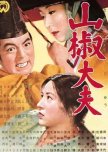
"A man is not a human being without mercy"
Sansho the Bailiff had little to do with the title character and everything to do with two noble children sold into slavery to him. A family torn apart never let the dream die of being reunited one day. They would all have to decide if they should continue doing the right thing when good things happened to bad people and bad things happened to good people.A governor who refuses to let the military conscript and further tax his people who have experienced famine for 13 years is stripped of his title and exiled. Before he leaves, he tells his son to remember that “A man is not a human being without mercy…Everyone is entitled to their happiness.” He gives Zushio the treasured family statuette of Kannon, the Goddess of Mercy to keep with him. His wife Tamaki and the two young children stay for a time with her brother and then determine to make the long trek in search of the father. Along the way they are betrayed in an area rife with bandits and slave dealers. Tamaki is sold into prostitution on a distant island and the children are sold into slavery to Sansho the Bailiff. Sansho is a cruel slave owner who keeps his slaves in a walled compound. Any attempt at escape results in a branding on the forehead. Sansho’s son, Taro, is kind to the children and tells them to endure until they are old enough to escape and make the difficult journey to their father. He then leaves the compound, never to return. As the children age, Anju adheres to her father’s words of wisdom while Zushio abandons them and in a twist of fate becomes the cruel "son" Taro could never be.
Calling out injustice was a familiar theme for Mizoguchi. In this film, the barbarism of forced labor camps was brought forth. More than once, the suffering of the common people was dismissed as unimportant by the affluent leaders. Much as his sister in real life had been, Tamaki was sold into prostitution. Despite the longing and despair of the characters, the scenery was amazing. Cinematographer Miyagawa Kazuo brought great beauty to the black and white film with stunning outdoor shots. Mizoguchi used water in several scenes—a lake and the ocean providing two of the more powerful moments in the film. Sansho’s slave encampment was claustrophobic and filthy, dark with hopelessness hanging over the weary people.
Sansho the Bailiff was based on a 1915 short story which was based on an old folk tale. What is curious about the title of the film was that Sansho was the villain and appeared far less than Zushio and Anju who were sold into slavery to him. Instead of Sansho’s story this was the boy Zushio’s as he grew into manhood. The mother and children were given different names along their journeys of suffering and as they sought to hold onto and rediscover their identities. Zushio’s growth and quest to reunite his family was the narrative backbone to the film. And if his growth was the backbone, Anju’s and Tamaki’s loving persistence was the life-giving blood of the film. Both women had deeply poignant scenes that will linger in my mind. Anju had a devastating scene that far from being melodramatic was like ripples through time that would affect other characters’ lives. And like those ripples the good done by the family members spread ever outward even when the family paid the cost. Sansho the Bailiff juxtaposed man’s cruelty and ability to be merciful, an ongoing battle even now as humankind decides who they want to be when they grow up.
15 April 2024
Was this review helpful to you?
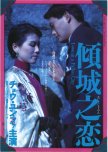
"Compared to the cosmos, how tiny we are!"
Two people dancing around a relationship struggle to understand each other’s feelings and even their own as the clock ticks down to the Japanese occupation of Hong Kong in Love in a Fallen City. Chow Yun Fat was sizzling as the westernized playboy who takes an interest in Cora Miao’s solemn divorcee.Pai Liu Su is being pressured to attend the funeral of her ex-husband. She’s been living with her family the last 7 years ever since she walked away after the brute had beaten her. In an explosion of words, her family tells her what a burden she’s been and how she never should have gone through with the divorce. All this despite the fact her brother lost her fortune in bad investments. Mrs. Hsu, a family friend, takes Pai and her younger sister to meet a couple of eligible men. Pai and Fan Liu Yuen hit it off before he leaves for Hong Kong. Mrs. Hsu invites Pai to accompany her to Hong Kong and stay as her guest. Pai and Fan grow closer as they spend time together, yet neither is sure of the other’s motives. Pai fears she will be just another notch in Fan’s belt and Fan fears Pai is only using him to get of out of her toxic household. Will the coming invasion drive them further apart or into each other’s arms?
“Life, death, and parting are immense things beyond our control.”
Chow Yun Fat brought the heat as he wooed the introverted Pai. I’d seen him in a number of action movies but here he turned on the charm and romance. It was hard to understand what Fan saw in Pai who appeared sullen most of the time. He seemed to enjoy the fact she was traditional, though untraditional enough to divorce and also to spend time with him.
“Laws can change from day to day, but morals and ethics, kinship and family, these things don’t change”
I’ve seen my share of Shaw Brothers kung fu movies filmed on their studio lots and with familiar exterior shots so it was a pleasant surprise to see the care and creativity allowed in this film. Hong Kong was explored and many scenes were filmed at the Old Repulse Bay Hotel. I was also pleasantly surprised to see so many women involved in the making of this film. Ann Hui was the director, it was produced by Mona Fong, and based on Eileen Chang’s novella. Violet Lam won the Best Original Film Score at the HKFA for her work.
“If everything should burn down, blow up, collapse, perhaps this wall will be left.”
I was confused by the timing of the story. The story took place from 1939-1941 approximately. My knowledge of Chinese history is minimal at best so my concerns may be over nothing. The Japanese occupied Shanghai by 1937 where the story began and there was no mention of their presence there in this film.
“Life’s never over for the poor.”
Despite Pai’s consistently somber attitude and the impending war, the movie never devolved into melodrama. Pai and Fan gradually worked their way through the problems hurled their way. The film clocked in around 90 minutes, short enough for the story to not become too maudlin and long enough to fall in love with Chow Yun Fat’s Fan Liu Yuen.
12 April 2024
Was this review helpful to you?
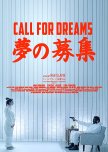
"Darkness makes me nervous"
If you threw some David Lynch and Wong Kar Wai movies in a blender along with the mood and palette of Blade Runner, mixed them up and threw them on a canvas, you would get a psychedelic Jackson Pollock work of twisted dreams and reality battered with ear and eye piercing sound and colors titled, Call for Dreams.“Every act of recording transforms the present into memory.”
Eko runs an ad in the paper soliciting a Call for Dreams. She receives messages about people’s dreams on her cassette answering machine. If she chooses the person, she helps to reenact the dream, much like a call girl only without the sex. Somehow the dreams shared and reenacted become intertwined with reality. Or do they? There is a fine line between dream and dreamer, reality and alternate realities, perhaps even sanity and madness.
“There is no ‘real’ anymore. You choose to act in a reality of your choice.”
The world Eko resides in is eternally dark and raining. Blue and pink lights follow her juxtaposed with pungent greens and yellows, and pops of retina damaging reds. City nightlines are showcased as she hurls through brightly lit tunnels. The music, colors, and movements twirl surreally as in a dream state. Only when the camera focuses on a police officer in Israel does it appear anchored in reality and then like a puff of smoke, the reality changes.
“People want to remember events, not necessarily in the way they happened.”
Is the film about dreams, reality, or memory? Only director Ran Slavin knows for sure. If you are in the mood for a mind tripping, illusion of reality and dream, this might be one to try. Keep in mind, “Is the dreamer dreaming the dream or is the dream dreaming the dreamer?"
11 April 2024
Was this review helpful to you?
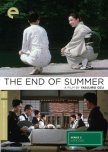
"Is this it? Is this really it?"
“Life is a running stream, forever changing.” Ozu Yasujiro once again examined how the world was ever changing and its effect on the individual and family dynamics. In his penultimate film, The End of Summer, a care-free father who does what he wants regardless of public opinion causes headaches for his family.“With so many captains, this ship will end up in the mountains!”
Manbei is a widower and owner of a small sake brewery that is beginning to fail. He spends most of his time disappearing during the day which causes consternation for his family and employees. Turns out he is seeing an old mistress again. Aside from his day pleasures and business concerns, the family is also trying to match-up Akiko, his widowed daughter-in-law, and also his younger daughter Noriko. Neither woman is receptive to the overtures of the men provided. Akiko is happy as she is with her young son. Noriko is in love with an assistant professor who moved away. Fumiko is the daughter who chastises the father for seeing the woman who had made her mother cry when she was alive. Manbei possibly has another daughter by the mistress though he is the only one who believes that. Yuriko’s only interest in Manbei as a potential father is securing a mink stole from him. Everything is fun and games until Manbei suffers a heart attack one evening which draws the family together.
“He did as he pleased his whole life…but he was also quite happy. It’s a rarity these days.’”
While the rapscallion of a father led his family on a merry chase, it was the sisters-in-law who captured my attention. Ozu made no moral judgements on the promiscuous head of the family but I found his childish behavior tiring. Akiko and Noriko (familiar Ozu names) had one of the most beautiful bonds in filmdom. Akiko gave Noriko advice on life and relationship matters. Akiko told Noriko when considering a husband, that character was more important than conduct, conduct could be changed but character couldn’t. Noriko wouldn’t allow Akiko to speak poorly of herself, charging her 100 yen every time she referred to herself as old. At the mother’s memorial service, they walked by the water and gracefully squat to talk perfectly in sync. Near the end of the film in a solemn moment they did the same thing. Despite being told differently by everyone else, the two mirror the father’s life philosophy and chose the paths that were right for them.
“I do miss the old days”
The changing world also crept into Ozu’s style with flashing neon lights used in several scenes. Instead of the rectangular imagery often used, the circular sake barrels were reflected in much of the family’s décor. Music and names in his movies were often repetitive as if they were barely an afterthought. In this film he used the composer from Good Morning. Though slightly more intrusive, it was mostly limited to transitions between scenes. Bird songs, crickets, and rhythmic drumming filled most scenes as characters talked with each other in their carefully composed settings. In two critical scenes, the faint whistle of the trains he loved could be heard. It was time for a long trip for one of the characters.
“Destiny is a strange thing.”
The ending of the film was darker and more somber than most Ozu films. Crows and the crematorium smokestack dominated the scenes with a couple of farmers ruminating on the cycle of life. Perhaps Ozu was contemplating his own death more. His mother died in the same year this film came out and he would die of throat cancer in 1963. That’s not to say the film was downbeat. Manbei provided humorous hijinks and the sisters-in-law provided a warm united front as they mapped out their own futures. The End of Summer provided a curious mix of humor and pathos with the scales carefully balanced in Ozu’s favor.
11 April 2024
Was this review helpful to you?
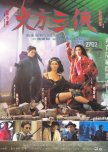
"Your life is more meaningful when you are willing to face yourself'
The Heroic Trio was a weirdly, wildly, stylized superhero movie starring three of the most beautiful women in Hong Kong films at the time. Michelle Yeoh, Maggie Cheung, and Anita Mui were caught up in an evil eunuch’s plan to steal babies and install one of them as the new emperor of China. This film had a Saturday morning superhero television show quality to it, if that show had cannibalism, decapitations, and dead babies and children.Tung is married to Inspector Lau. Little does her husband know that she is the much admired hero, Wonder Woman. When babies are being kidnapped with no ransom notes the duo springs into action in their own ways. Chat, The Thief Catcher, rolls in on her motorcycle armed with a pump shotgun and dynamite and saves the day when she rescues hostages at a chemical warehouse. A superhero for hire, she gives her card to the police chief whose new baby has been targeted. Ching, The Invisible Woman, works for the merciless and powerful eunuch who lives in an enormous fortress in the sewers. The eunuch believes that, “China cannot be without an emperor.” And by that he means an emperor he controls so that he would be the de facto ruler. By day Ching lives with The Professor who invented the Invisible cloak so that when it is perfected, she can steal it and kill him. She may not get the chance as the invisibility process is deadly toxic. The three women warriors collide as the kidnappings become more complicated and deadly. The eunuch’s superpowered minion, Kau, brings danger and loss of body parts whenever he appears.
This movie was off the rails bonkers and not for the faint of heart. In Western films, killing and torturing children is right up there with killing pets, it’s rarely done, or at least not done onscreen so the cruelty toward children was quite disturbing for me. The Flying Guillotine survived the ages from the 1975 movie and made a cameo here. There were also a variety of throwing weapons, explosives, razor bladed chains, and poison darts used. The women’s most powerful weapons were the humanity and sisterhood that had almost been trained out of them. Only through their combined powers could they take down the maniacal eunuch. Many of the actions scenes were filmed in low lighting as the characters climbed, leapt, and fell repeatedly. Despite the darkness, the wires showed at times, at other times the train broke through the fourth wall. While exploring the superhero genre, the film kept its feet firmly flying in Hong Kong wuxia history as well.
What was the draw to this absurd superhero movie? The cast! Michelle Yeoh was gorgeous with her flowing hair and impeccable timing, completely believable as the conflicted anti-hero. Ching had the most painful character growth spurred by her inconvenient love for the professor. It would take Chat and Tung to give her a reason to live and break free from the eunuch’s hold. Maggie Cheung went from cocky bounty hunter to the vulnerable middle child caught between two sisters she loved. Anita Mui alternated as the devoted wife and ferocious heroine who was the moral compass of the trio. The three women each had tortuous pasts that they had to come to terms with in order to move forward.
The Heroic Trio was not a great movie but it was entertaining. At times it veered into so bad it was good, especially near the end with an unhinged final fight. Regardless of the movie's shortcomings, it's always refreshing to have competent women warriors and superheroes even if the movie didn’t always serve them well. For fans of these actresses, if you can keep your expectations low, it’s definitely one to give a try.
10 April 2024
Was this review helpful to you?

"What comes after?"
That Day on the Beach opens with two women connecting after thirteen years. This film is not about their friendship for the most part, it primarily focuses on Jia Li’s choices and desire for her elusive happiness. The story is decidedly not linear, more circular, as director Edward Yang examined dysfunctional families, work places, and marriages.Tan Wei Ching, a celebrated pianist, made her first trip home to Taiwan after 13 years. She received a message from an old classmate and at the last minute decided to meet her for coffee. The classmate, Jia Li, is the sister of the boy she loved long ago. When Jia Sen was forced to marry someone else, Wei Ching cut ties with Jia Li and took a scholarship to study abroad. After the loss of her friend, Jia Li began dating Cheng De Wei. She discovered her father made a marriage pact for her, too. Watching the silent, sullen dinners with Jia Sen and his new wife convinced her she did not want that fate. She packed up and left that night. She and De Wei married soon after. De Wei’s old friend was shoring up his position at the company he worked for by hiring old friends and recruited De Wei. Soon the young couple bore the strain of the long days and nights De Wei was required to work and party.
I began this film thinking it was about two friends reconnecting. Around the 20-minute mark of this 165 minute film, Tan Wei Ching was all but forgotten. She’s the friend that got roped into someone’s life story when she asked, “Are you married?” That Day on the Beach also tries to lure the viewer in with police searching a beach during the movie’s introduction, making it seem this element would be ultimately pertinent to the story. Everything was window dressing and red herrings until the story of the excruciatingly slow and painful dissolution of Jia Li’s marriage began. With all of the flashbacks and flashbacks within flashbacks, I’m not entirely sure how long the agony went on for her, somewhere around 7 years. Honestly, it seemed longer. During this time, it was a constant back and forth of two people unable to communicate or come up with a better plan who kept thinking if they both said, “You don’t understand me,” enough, it would make a difference.
Jia Li was looking for love and happiness, thinking that marriage would bring it. It was not what she expected. De Wei was working at a job that required him to drink and socialize which he hated. Jia Li was naïve and De Wei was cowardly and both were completely disillusioned with their marriage. Li’s brother was miserable. Her mother had come to terms with her own flawed husband. Tan Wei Ching still missed the boy she’d loved. Everyone was unhappy and unfulfilled except for possibly the two most cynical characters. A predatory businesswoman and De Wei’s playboy boss seemed to be doing fine using the people around them for financial gain and pleasure. “The world I grew up in taught me that it’s a world without love. Perhaps you will find a moment or two of passion, but that’s not much.” The big mystery, regardless of outcome, was the result of a man willing to chew off his own arm to escape, but not the courage to confront the problem.
That Day on the Beach was a creative approach at displaying the costs of complex relationships, traditions, and toxic work environments. I was grateful that Jia Sen gave Li a piece of advice that helped her finally, after 13 years and 160 minutes, have some substantial character growth. If you are a fan of Edward Yang and long family dramas that tend to be caught up in a cycle of pain and dysfunction, this is one to try.
9 April 2024
Was this review helpful to you?
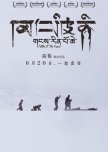
"What matters is your heart"
While Lao Tzu may have stated that the journey of a thousand miles/km begins with one step, he never imagined how the pilgrims in this film would experience that 1200 km journey. Prostrating themselves every 8 steps, the men, women, and child, traversed mountains in the bitter cold and blasting heat as they traveled for months to the holy mountain. Paths of the Soul was a deeply meditative experience in people acting out their faith in an arduous manner, never complaining and never faltering in their spiritual quest.In a remote Tibetan village five men and four women decide to make the physically demanding pilgrimage to the holy mountain at Lhasa. The idea came from an old man who had never left the village. His brother died before performing the pilgrimage and he is determined to go. A pregnant woman wants her baby to be blessed by being born on the pilgrimage. An alcoholic butcher desires to pay for his sins by going. Two brothers want to honor the two laborers who died while building their house. And a little girl who will have no one to provide for her at home joins the group. One volunteer drives the tractor that pulls their tents and supplies as a priest leads the way. The pilgrims wear heavy animal skin aprons to protect their bodies and clothes when they slide forward on the ground and wooden planks on their hands. They chant, clap, and prostrate themselves, forehead to ground, get up and do it all over again in 8 steps or so for approximately 1,574,400 steps.
The film was shot documentary style and felt very much like one. Instead of focusing on the different sojourners as individuals, they remained a coherent group for the most part. Tsring had the spotlight for a moment when she went into labor but it was shot somewhat dispassionately and she was soon back on the road with the others, her baby swaddled among the tents. Regardless of the challenges the villagers faced, they never whined and rarely complained. If someone was injured or had a baby they waited. Shoes wore out and were replaced by inexpensive ones. When the tractor had mechanical trouble, they dealt with it. The miracle was not completing the arduous journey, it was a dozen people staying focused on their prayers and goals and not dissolving into petty squabbles when they faced exhaustion and challenges. They truly displayed a holy persistence and willingness to overcome obstacles.
Hospitality and generosity flowed on the road both from locals and the devotees. When a farmer offered them shelter and food, they returned his kindness. A cup of tea gifted on the side of the road was enough to bolster bodies and spirits. When they ran out of money, they simply found whatever job was available without grumbling. Back home people cared for their homes, families, and herds for the months they were gone. Watching the villagers walk and prostrate themselves never became old. At times they appeared as only specks of dust on the horizon. The scenery and seasons changed as they traveled from snow covered mountains to verdant valleys, showcasing the beauty of Tibet with excellent cinematography work. There was no musical score except for the chants and singing of the fellowship. One evening they sang and danced on lush green grass next to a river, another time they sang as they pushed the broken carriage up the mountain. And every night in the tent they would talk, sometimes laughingly about the bumps on their foreheads, and finish the day with prayers. Then in the morning they would face the seemingly endless winding road before them and begin their chants and bows all over.
The pilgrims dealt with rockslides, water covered roads, mud, and extreme weather on their sacred journey as they prayed for the safety and happiness for all. They were a determined band of people who were a deeply committed community. More than that, they were family. While the journey of 1200 km was grueling physically and mentally the overwhelming feeling of watching these people was one of peace.
8 April 2024
Was this review helpful to you?
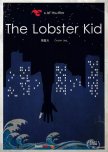
"They do nothing. Like you"
The Lobster Kid is a short film that punched above its weight. Short on time and budget, director Jsf Hsu made the most of each scene and supplied a lovely soft jazz score to fit the mood.A thirteen-year-old girl is trapped in a street gang. She uses lobster analogies when her mind needs to hide from the violence of her surroundings. She desires to escape far away to Taitung and be closer to the lobsters’ surf. Suffering from the punishment of trying to leave, she inadvertently winds up with a begging priest. As the priest has taken a vow of silence, she makes herself at home traveling the city with him, using him to sell her wares and make money for him, too.
The performances were natural with only the gang mistress sliding over the top. The rapport between the girl and monk flowed easily accompanied by a delicate humor. At one point she met up with a friend and played with the young woman’s small daughter. The monk saw that the con artist was little more than a child herself, generous and kind in spirit. The gentle jazz score never intruded but buoyed the action subtly.
My rating might be a tad high given the sometimes amateur performances. The ending won me over and warmed my heart, putting a smile on my face. Like the silent monk who could appear and disappear, I wanted to do whatever was necessary to make this homeless child happy.
7 April 2024
Was this review helpful to you?
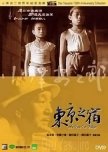
"Human beings have the best of times as kids who know nothing"
A desperate father traversed a dusty road outside of Tokyo searching for work during the Depression in An Inn in Tokyo. Ozu Yasujiro held back nothing in this his final extant silent film. Regardless of the lack of sound, this tender and tragic story of parents struggling to provide the basic necessities of life for their vulnerable children was emotionally compelling.Kihachi and his sons, Zenko and Shoko, carry their meager belongings in one small pack. Most days they must choose between eating or shelter. If they are lucky, they can turn stray dogs in for 40 yen. In a sprawling industrial complex, Kihachi is unable to get past the front guard to even apply for a job at one of the factories. He and his boys meet a widow and her young daughter who are in the same dire straits his family is, maybe worse. Otaka is looking for work, but as a woman, there are few available options. Late one night when Kihachi and the boys have nowhere to go but under an awning in the pouring rain, an old friend appears and takes the bedraggled family in. She helps Kihachi find a job and provides a room for them. Only a thin line stands between them and disaster or happiness.
This film was fairly realistic about the time of economic calamity. It was heartbreaking watching Kihachi and his sons mime eating their favorite meal and drinking sake on painfully empty stomachs. A father having to make the choice of whether to feed his children or provide shelter for them for the night was cruel. Zenko made a foolish choice of purchasing a hat with money he made that could have fed them. His father berated him but then turned around after being hired and spent money on sake. In the desolate fields, Kihachi and Otaka marveled at their children’s resiliency in an endearing moment as the kids developed an instant bond while playing. As Kihachi’s affection for Otaka grew, he assumed she would find respectable work as he did, though his good fortune was aided by an old friend and the benefit of being male. When tragedy inevitably struck both Otaka and Kihachi made devastating sacrifices. “Thus has a soul been saved.” Saved, maybe. But the future of the children was put into further emotional and financial jeopardy. Which further illustrated that people pushed to the edge of survival will do things that might seem immoral, especially when a parent is protecting a child.
Even though Ozu refused to have sound and spoken dialogue, the studio insisted on a musical score. The instrumental music was mournful and a touching addition. Dusty fields outside the factories provided a hopeless wasteland threatening to swallow the destitute wanderers made all the more surreal as children played among the industrial equipment. Sakamoto Takeshi as Kihachi, Aoki Tomio as Zenko, and Iida Choko as Otsune performed in numerous Ozu films and gave strong performances here. Ozu constant, Ryu Chishu, also made a brief appearance in a bit part.
Ozu painted a bleakly realistic picture of poverty and despair with moments of hope and sunshine often provided by the children. He also had his characters illustrate that despite the bleakness of their existence there were still opportunities for heartfelt kindness, laughter, and generosity. If you enjoy the films of Ozu Yasujiro or quality silent films, this is one to try.
5 April 2024
Was this review helpful to you?

"If you call me sister you have to be worthy of it"
I set the bar pretty low for these ultra short dramas, but Revenge of Royal Princess taxed my patience all while getting me to click on the next episode to see how the writers would dig themselves out of the hole they put themselves in. I’m still not sure that they did. There were a number of “what the what?” moments or times I thought I must have accidentally skipped some episodes.Li Yan Chu is the fierce princess who helped her hapless brother become emperor and fend off a coup. She saves the hostage Han Shu from execution and trains him to be her brother’s sharpest blade. Knowing she’s dying she plans her assassination to tie Han Shu tighter to the emperor. Instead of just becoming a bodyguard, somehow Han Shu is made a Regent and has a complete personality change. The deceased Li Yan Chu has her own transformation when magically her spirit inhabits the body of a murdered warrior who looks like her. Uh, what? She goes back seeking revenge and keeps her true identity a secret from both Han Shu and her brother.
Yan Chu was ruthless and treated Han Shu like a trained pet. Even as Xie Yu Gui, she offered him no kind words. All of her kindness was saved for her worthless brother. Han Shu’s temperament could cause whiplash with how quickly it could change. Aside from Yan Chu and Han Shu, there was also the Prime Minister seeking power and his conniving daughter with the most annoying voice seeking to be Han Shu’s wife. The acting ranged from adequate to please stop you are making my ears bleed. The story had a tendency to skip forward and around without any warning or logical consistency, even for a short drama trying to wedge as much story in as possible. There were many times I checked the episode number when my brain went, “Wait, what just happened?”
If you can handle the jumps in story and lapses in logic, there is entertainment to be had. This was a tale of ruthless people trying to outsmart and outruthless the others. If you are looking for romance or a sweet story, this ain’t it.
5 April 2024
Was this review helpful to you?

 31
31 96
96 7
7




















